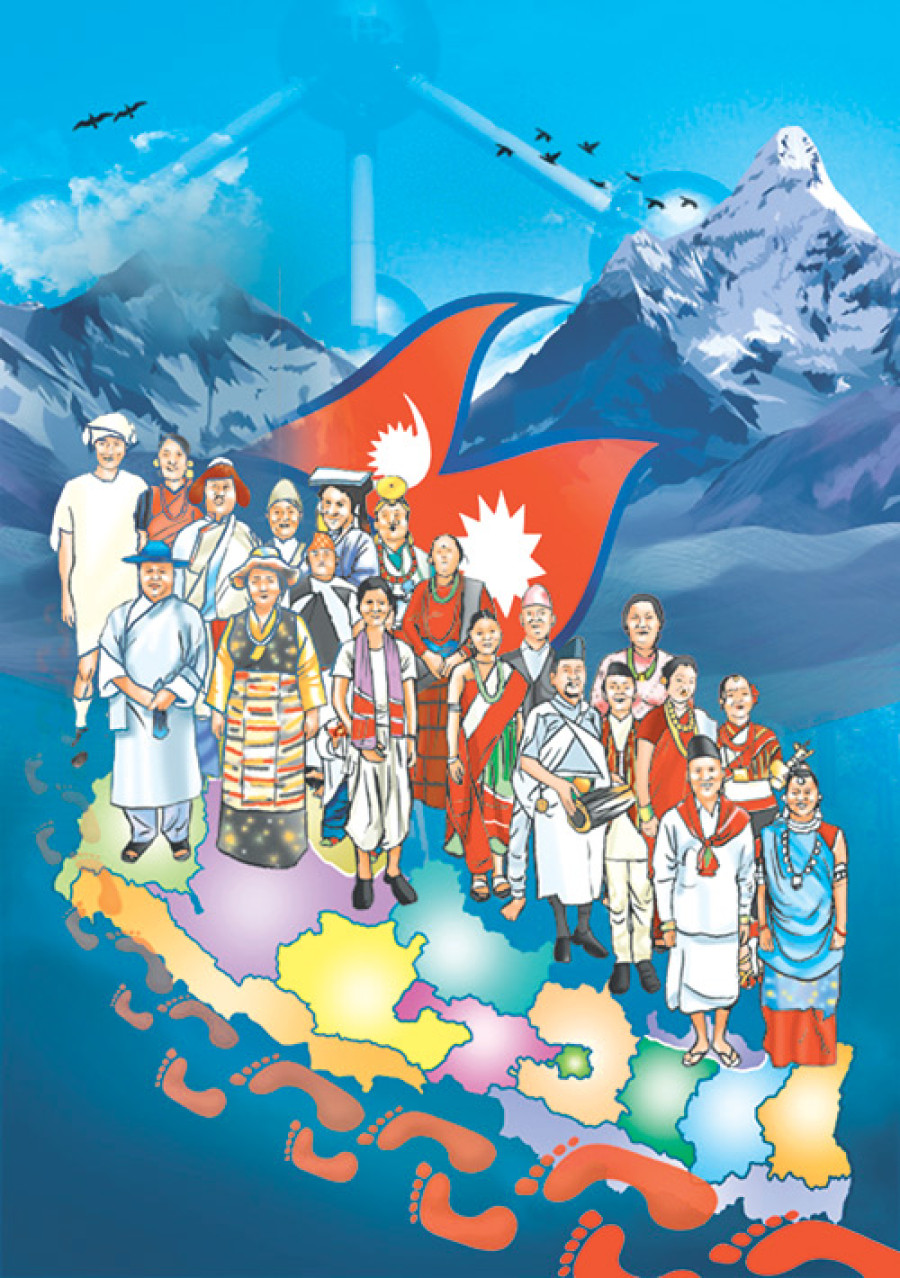Opinion
Democratising nationalism
Recently, one of the most powerful leaders of the CPN-UML, Bam Dev Gautam, said federalism was a poison that was driving the country towards conflict and that the moves by the government to amend the constitution were anti-national.
Recently, one of the most powerful leaders of the CPN-UML, Bam Dev Gautam, said federalism was a poison that was driving the country towards conflict and that the moves by the government to amend the constitution were anti-national. Earlier in October, as the parties sat down in an eastern district to decide the boundaries, number and categories of the local bodies, ethnic leaders within the Nepali Congress (NC) were unable to speak within the party. “So we resorted to all-party ethnic organisations to lobby for autonomous areas and protected areas,” one party official said. So sensitive was the issue that when the UML decided to reduce the number of autonomous and protected areas for the district’s ethnic groups, the FM radio station that aired the news was attacked.
These instances in the last few months are just some of the examples of the way mainstream political parties have been developing an uneasy relationship with federalism and ethnic identity. They demonstrate that the challenges to achieving a pluralistic democracy emerge as much from mainstream parties as ethnic groupings engaged in the politics of identity.
A pluralist democracy is a political sphere where group identities are not hardened, where all political parties are inclusive, and where all citizens are equal. A nation-state cannot become a democracy unless its nationalism is democratic. Democratisation of the nation-state, therefore, must entail the democratisation of Nepali nationalism. One way to transform our nationalism so that it can include all citizens is to imagine a common future. It will be easier for us to devise a political path to reach that imagined future of political pluralism.
Hill-centrism as nationalism
In order to move towards political pluralism, we need to recognise that nationalism can be a form of disguised hill-centrism, and that this kind of ethno-centrism can be powerful enough to define ‘national interests’ and ‘nationalism’. For example, while the UML has called the move to separate the Madhes from the hills in Province 5 as ‘anti-national’, the party is dead set against merging two hill districts with Province 2. In one case, the party wants to retain Butwal as part of a hill province while, in the other, it wants to prevent Udayapur and Sindhuli from becoming part of a Madhes province. The UML’s positions appear contradictory because they are guided by hill-centrism; no wonder they are drawing the ire of the Madhesis.
The case with the NC and the CPN (Maoist Centre) is not much different. The Nepali Congress was reluctant to part with the monarchy, and although its top leaders have been trying to appease the Madhesis, a majority of the party’s leaders sympathise with the UML. So do those of the CPN (MC). In Butwal, anti-federalists in the NC and the CPN (MC) worked with the UML leaders to generate a massive protest. Such short-sighted politics is understandable. The federalism agenda, although inspired by the Maoist movement, was not an inherent component of the 2006 People’s Movement. It became an integral part in 2008 after the Madhes movement. Whether people like it or not, federalism is inextricably linked to the notion of nationalism.
Citizenship, nationalism, development
Dissimulation of ethnocentrism is complemented by a parallel process of silencing differences. Many groups who espouse Nepali identity are performing a double act; one, disguising the ethnic nature of their own social supremacy, and two, silencing differences to maintain the status quo. The main strategy to silence differences is to use the slogans of citizenship, Nepali nationalism and development. By emphasising these slogans, while at the same time resisting inclusion and federalism, the real intent is to create social order and maintain social solidarity by silencing differences rather than by generating consent.
Ultimately, plural politics requires lessening the salience of group identity in the political arena. In order for pluralistic democracy to survive and strengthen in Nepal, group-based identities must have less and less relevance in politics. Ultimately, Nepal as a nation must rise above group identities. But such a path is not possible without ending inequality and discrimination based on collective identities, whether it is related to women, citizenship or Madhesis.
Ethnocentrism, however, will never go away, especially in times of economic and existential crisis. Studies show that the greater the perception of a threat to security, the stronger the tendency to push in-group cooperation by excluding others. However, we can work to lessen the relevance and, hence, the salience of ethnic identity in the political arena. A process of lessening the relevance of group identity must be accompanied by a parallel process where mainstream political parties are able to promote inclusion and provide meaningful representation to different groups. All ethnic groups have cultural rights, and promotion of culture is bound to enhance the ethnic identities of the people. The solution, therefore, is not to end ethnic markers, but to adopt mechanisms and processes that allow mutual recognition and respect.
Common political future
Democratising nationalism allows us to attain national solidarity without sacrificing the fundamental rights of one group to protect the wishes of others. Democratisation of nationalism can only be possible if political parties are democratised. There can be no arguing that in order to promote a pluralist democracy, the relevance of ethnicity-based politics should decrease. However, trying to discourage identity politics would spell disaster without putting in place mechanisms and processes for meaningful inclusion and representation of groups or ending the dominance of Brahmin and Chhetri cultural values and attitudes in mainstream political parties. Political parties that are democratic will allow meaningful participation of marginalised communities, Madhesis and Janajatis.
However, if mainstream political parties fail to represent the aspirations of ethnic groups or other collective identities, people will continue to mobilise around collective identities; and once these identities become hardened, it will be more and more difficult for Nepal to move towards a pluralistic vision or establish a new kind of nationalism that can include all citizens regardless of their ethnic or group identity.
If Nepal wants to achieve political stability, it must quickly and wisely address issues that have generated political organisation around shared identities. In resolving such issues, our common political future must become the bottom line. Rather than hardening group and ethnic differences, such solutions must be flexible enough to give way to pluralistic politics in the long run. In the case of federalism, it means that the design of a federal structure and demarcation of state boundaries must initially address political aspirations and rights of groups, but over the long run, it must allow pluralistic democracy to emerge.




 17.12°C Kathmandu
17.12°C Kathmandu










